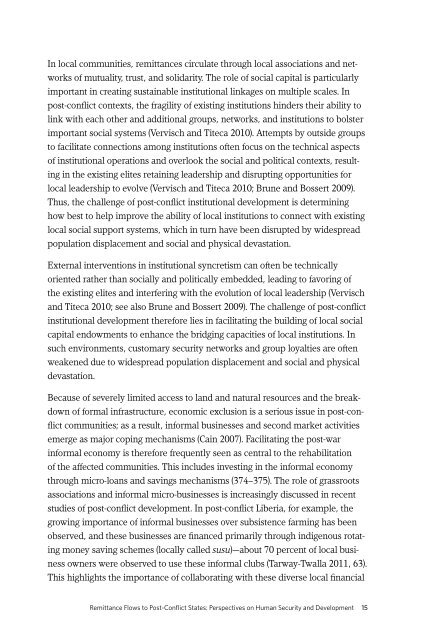Pardee-CFLP-Remittances-TF-Report
Pardee-CFLP-Remittances-TF-Report
Pardee-CFLP-Remittances-TF-Report
You also want an ePaper? Increase the reach of your titles
YUMPU automatically turns print PDFs into web optimized ePapers that Google loves.
In local communities, remittances circulate through local associations and networksof mutuality, trust, and solidarity. The role of social capital is particularlyimportant in creating sustainable institutional linkages on multiple scales. Inpost-conflict contexts, the fragility of existing institutions hinders their ability tolink with each other and additional groups, networks, and institutions to bolsterimportant social systems (Vervisch and Titeca 2010). Attempts by outside groupsto facilitate connections among institutions often focus on the technical aspectsof institutional operations and overlook the social and political contexts, resultingin the existing elites retaining leadership and disrupting opportunities forlocal leadership to evolve (Vervisch and Titeca 2010; Brune and Bossert 2009).Thus, the challenge of post-conflict institutional development is determininghow best to help improve the ability of local institutions to connect with existinglocal social support systems, which in turn have been disrupted by widespreadpopulation displacement and social and physical devastation.External interventions in institutional syncretism can often be technicallyoriented rather than socially and politically embedded, leading to favoring ofthe existing elites and interfering with the evolution of local leadership (Vervischand Titeca 2010; see also Brune and Bossert 2009). The challenge of post-conflictinstitutional development therefore lies in facilitating the building of local socialcapital endowments to enhance the bridging capacities of local institutions. Insuch environments, customary security networks and group loyalties are oftenweakened due to widespread population displacement and social and physicaldevastation.Because of severely limited access to land and natural resources and the breakdownof formal infrastructure, economic exclusion is a serious issue in post-conflictcommunities; as a result, informal businesses and second market activitiesemerge as major coping mechanisms (Cain 2007). Facilitating the post-warinformal economy is therefore frequently seen as central to the rehabilitationof the affected communities. This includes investing in the informal economythrough micro-loans and savings mechanisms (374–375). The role of grassrootsassociations and informal micro-businesses is increasingly discussed in recentstudies of post-conflict development. In post-conflict Liberia, for example, thegrowing importance of informal businesses over subsistence farming has beenobserved, and these businesses are financed primarily through indigenous rotatingmoney saving schemes (locally called susu)—about 70 percent of local businessowners were observed to use these informal clubs (Tarway-Twalla 2011, 63).This highlights the importance of collaborating with these diverse local financialRemittance Flows to Post-Conflict States: Perspectives on Human Security and Development 15


